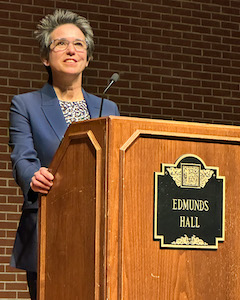Cook Political Report publisher discusses political landscape during seventh annual Waters Lecture at PC

Dr. Justin Lance, associate professor of political science; Dr. Matthew vandenBerg, PC president; Amy Walter, Cook Political Report; Sam Waters ’66 attorney; and Creighton Waters, attorney.
One of the country’s leading political analysts discussed the remarkable trends in national politics during a lecture at Presbyterian College Tuesday.
Amy Walter, the publisher and editor-in-chief of the Cook Political Report, was this year’s guest speaker for the Samuel Calvin Waters ‘66 Lecture in Political Science, co-sponsored by the college’s political science department and the Russell Program.
Walter said the current political landscape is at once incredibly stable and volatile.
“From the stability side, since 2008, we have had very few states switch in the Electoral College from voting for a Democrat one election and for a Republican in the next election cycle,” she said. “In face, 80 percent of all states voted the same way in four consecutive elections.”
Throughout the 20th century, states have typically followed waves of support for presidential candidates from either party where a wide swath of voters support one candidate over another, Walter said. Since 2008, though, only 10 states have flipped from one party over another in presidential races.
“We just don’t have that many swing voters anymore,” she said. “Fewer and fewer people are splitting their tickets between the president, their member of Congress, or senator.”
 Walter said when she first started covering the U.S. House of Representatives, there were more than 100 so-called “flip districts” where voters made choices based on the person and not their political party. Today, there are only 23 such districts nationwide where voters, by and large, supported a presidential candidate from one party and another elected official from another.
Walter said when she first started covering the U.S. House of Representatives, there were more than 100 so-called “flip districts” where voters made choices based on the person and not their political party. Today, there are only 23 such districts nationwide where voters, by and large, supported a presidential candidate from one party and another elected official from another.
Fewer people live in swing counties, as well, Walter noted. Thirty-two years ago, approximately 40 percent of voters lived in counties that cast more than 60 percent of their ballots for one presidential candidate. She said that nearly two-thirds of the country lives in those counties.
Ironically, the statistical stability adds volatility to national politics, Walter said.
“In an evenly-divided country, just a few thousand votes can make a difference, not just in winning or losing but whether or not your party is in power – whether they control the House or the Senate or the White House.”
In the 2022 mid-term elections, only 6,000 votes over five districts were the difference between Democrats and Republicans as the GOP regained control of the House, said Walter. It is unprecedented, she added.
“When I first came to Washington, the House didn’t change all that much and had been in Democratic control for most of the 20th century,” she said. “Then the House flipped to Republicans in 1994 and didn’t flip again until 2006. Over 51 years, control of Congress changes hands twice. Since 2005, it has flipped four times. For the first time in history, we have had four consecutive presidents lose the House and the Senate during their tenure in office.”
Walter argued that part of the divide between parties is how they portray one another publicly.
“As we more closely identify with a team, we come to see the other side not as a rival but as an enemy,” she said. “Not only is my side right but the other side is wrong and terrible and evil.”
Walter said people also are more isolated and tribal in the way they gather information.
“You can put yourself in a nice little cocoon,” she said. “You never hear or see or read things you don’t already believe or want to see.”
Because voters are so insulated, they also have greater difficulty accepting that other people do not share their choice of candidates.
“As we’re evenly divided, the margins become narrower and the stakes become higher,” Walter said. “It’s an existential battle between good and evil. We’re good and you’re evil. That’s where we sit today. That is the moment that we’re living in.”
Walter said a rematch between President Joe Biden and former president Donald Trump is very likely and almost certain to reveal the same partisan divide.
“Part of the challenge we’re living in right now is, are we really destined to live out the rest of our days in this polarized divided county or will we break the cycle that we’ve been in for what seems like forever, but, certainly, for the last 10 years,” she said.
Still, Walter said there is room for hope. Even as information sources tell voters from different parties to dislike one another, Americans have far more in common than they think.
“Our optimism and resilience is what really makes America American,” she said.
Walter said the political scientist Samuel Huntington wrote: “Critics say that America is a lie because its reality falls so far short of its ideals. They are wrong. America is not a lie; it is a disappointment. But it can be a disappointment only because it is also a hope.”
Her hope, she said, resides with young people like the students at PC.
“You guys are pretty awesome,” she said. “I have a lot of faith in you and in this generation coming up behind you. You are our first true 21st century generation. You see problems differently than we do. You see everything from politics to gender to race and class radically different from any other generation. I believe your continued efforts to redefine 20th century institutions will help the country heal and move forward. I am very thankful for you and hopeful for all of us.”
